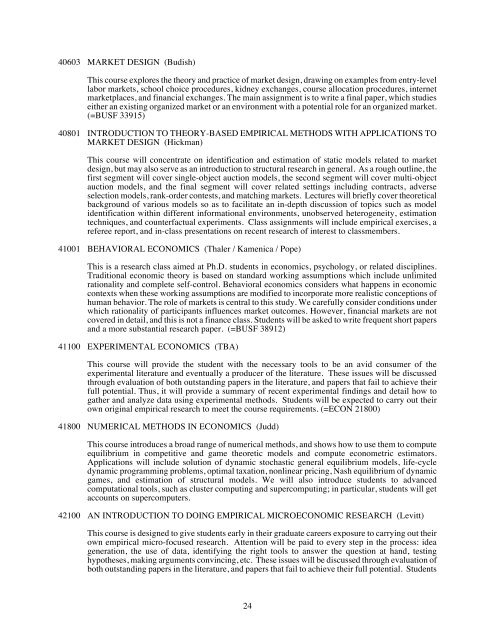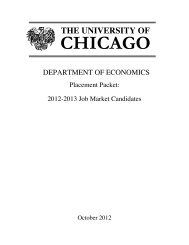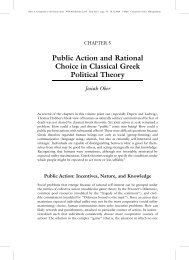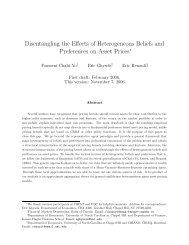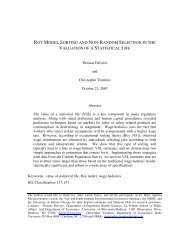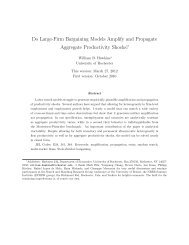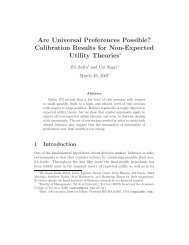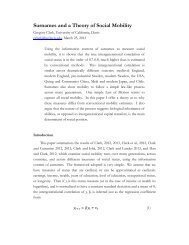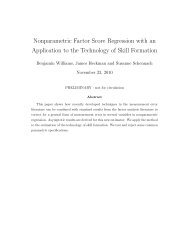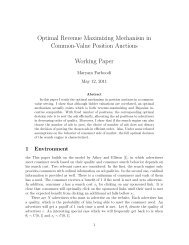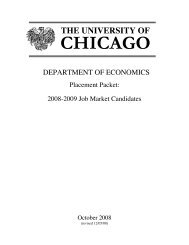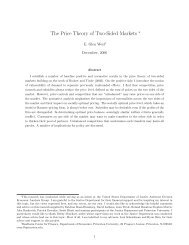Graduate Program Guidebook - University of Chicago Department of ...
Graduate Program Guidebook - University of Chicago Department of ...
Graduate Program Guidebook - University of Chicago Department of ...
You also want an ePaper? Increase the reach of your titles
YUMPU automatically turns print PDFs into web optimized ePapers that Google loves.
40603 MARKET DESIGN (Budish)This course explores the theory and practice <strong>of</strong> market design, drawing on examples from entry-levellabor markets, school choice procedures, kidney exchanges, course allocation procedures, internetmarketplaces, and financial exchanges. The main assignment is to write a final paper, which studieseither an existing organized market or an environment with a potential role for an organized market.(=BUSF 33915)40801 INTRODUCTION TO THEORY-BASED EMPIRICAL METHODS WITH APPLICATIONS TOMARKET DESIGN (Hickman)This course will concentrate on identification and estimation <strong>of</strong> static models related to marketdesign, but may also serve as an introduction to structural research in general. As a rough outline, thefirst segment will cover single-object auction models, the second segment will cover multi-objectauction models, and the final segment will cover related settings including contracts, adverseselection models, rank-order contests, and matching markets. Lectures will briefly cover theoreticalbackground <strong>of</strong> various models so as to facilitate an in-depth discussion <strong>of</strong> topics such as modelidentification within different informational environments, unobserved heterogeneity, estimationtechniques, and counterfactual experiments. Class assignments will include empirical exercises, areferee report, and in-class presentations on recent research <strong>of</strong> interest to classmembers.41001 BEHAVIORAL ECONOMICS (Thaler / Kamenica / Pope)This is a research class aimed at Ph.D. students in economics, psychology, or related disciplines.Traditional economic theory is based on standard working assumptions which include unlimitedrationality and complete self-control. Behavioral economics considers what happens in economiccontexts when these working assumptions are modified to incorporate more realistic conceptions <strong>of</strong>human behavior. The role <strong>of</strong> markets is central to this study. We carefully consider conditions underwhich rationality <strong>of</strong> participants influences market outcomes. However, financial markets are notcovered in detail, and this is not a finance class. Students will be asked to write frequent short papersand a more substantial research paper. (=BUSF 38912)41100 EXPERIMENTAL ECONOMICS (TBA)This course will provide the student with the necessary tools to be an avid consumer <strong>of</strong> theexperimental literature and eventually a producer <strong>of</strong> the literature. These issues will be discussedthrough evaluation <strong>of</strong> both outstanding papers in the literature, and papers that fail to achieve theirfull potential. Thus, it will provide a summary <strong>of</strong> recent experimental findings and detail how togather and analyze data using experimental methods. Students will be expected to carry out theirown original empirical research to meet the course requirements. (=ECON 21800)41800 NUMERICAL METHODS IN ECONOMICS (Judd)This course introduces a broad range <strong>of</strong> numerical methods, and shows how to use them to computeequilibrium in competitive and game theoretic models and compute econometric estimators.Applications will include solution <strong>of</strong> dynamic stochastic general equilibrium models, life-cycledynamic programming problems, optimal taxation, nonlinear pricing, Nash equilibrium <strong>of</strong> dynamicgames, and estimation <strong>of</strong> structural models. We will also introduce students to advancedcomputational tools, such as cluster computing and supercomputing; in particular, students will getaccounts on supercomputers.42100 AN INTRODUCTION TO DOING EMPIRICAL MICROECONOMIC RESEARCH (Levitt)This course is designed to give students early in their graduate careers exposure to carrying out theirown empirical micro-focused research. Attention will be paid to every step in the process: ideageneration, the use <strong>of</strong> data, identifying the right tools to answer the question at hand, testinghypotheses, making arguments convincing, etc. These issues will be discussed through evaluation <strong>of</strong>both outstanding papers in the literature, and papers that fail to achieve their full potential. Students24


